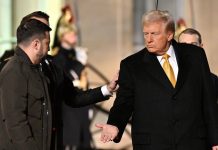BEIJING (Reuters) – Global Times called the G7 an “anti-China workshop”, a day after Beijing summoned Japan’s envoy and berated Britain in a fiery response to statements issued at the group’s summit in Hiroshima.
China was mentioned 20 times in key communiqués by G7 leaders, the highest number in recent years, but down from 14 times in 2022.
“The reaction from China this time is quite strong,” said Wang Jiangyu, a professor at the City University of Hong Kong.
“The G7 has expressed many concerns (about China) in an unprecedented way. China considers these issues to be its core interests, these are exclusively internal affairs, and the G7 cannot speak out. ‘ said. Beijing has not only criticized G7 statements about Taiwan, the democratic island China claims to be its own, but has also double-sided with the United States and its allies when it comes to statements on improving nuclear weapons and using economic power. accused of being the norm.
Group of Seven (G7) declarations issued singled out China on issues including Taiwan, nuclear arms, economic coercion and human rights abuses, underscoring the wide-ranging tensions between Beijing and the group of rich countries which includes the United States.
“The U.S. is pushing hard to weave an anti-China net in the Western world,” Global Times said in an editorial on Monday titled “G7 has descended into an anti-China workshop”.
“This is not just a matter of brutal interference in China’s internal affairs and smearing China, but also an undisguised urge for confrontation between the camps.”
Beijing’s foreign ministry said it firmly opposed the statement by the G7 – which also includes Japan, Britain, Canada, France, Germany and Italy – and late Sunday said it had summoned Japan’s ambassador to China in a pointed protest to the summit host.
Russia, a close ally of China that was also called out in the G7 statement over its war in Ukraine, said the summit was an “incubator” for anti-Russian and anti-Chinese hysteria. Separately, the Chinese embassy in London urged London to stop smearing China after British Prime Minister Rishi Sunak said the Chinese government posed the world’s biggest challenge to security and prosperity.
Despite Beijing’s reaction, US President Joe Biden said he hopes the frosty relationship with China will be resolved “soon.”
But some analysts see no signs of an immediate easing of tensions, especially given Beijing’s swift and sharp counterarguments.
“Beijing’s response (especially the early timing of its release) suggests that tensions in the region are already quite high and could rise further,” said Moritz Rudolf, a research fellow and fellow at Yale University’s Paul Tsai China Center. It confirms something,” he said.
Some analysts said China’s decision to summon the Japanese ambassador underscores the intensity of China’s anger. China’s Vice Foreign Minister Sun Weidong summoned ambassadors to register a protest against “hype over China-related issues,” the ministry said in a statement.
Sun said that Japan, in cooperation with other countries at the G7 summit, “defamed and attacked China, grossly interfered in China’s internal affairs, and violated the basic principles of international law and the spirit of the four China-Japan political documents.”.
Ambassador to China Hideo Tarumi said it was “natural” for the G7 to continue to address common concerns, and will continue to do so unless China changes its behavior.






